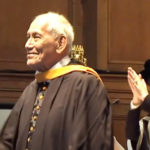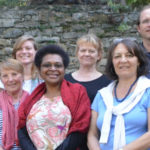THE CENTRE FOR PACIFIC STUDIES
The Centre for Pacific Studies is unique in the UK and is internationally recognised for its research, teaching, impact and public engagement portfolios. Since 2008, CPS has played a leading role in research throughout the wider Oceania region, and has created international partnerships across Europe and with research institutions across the Pacific.
St Andrews is unavoidably distant from the Pacific in geographical terms, and as such CPS has emphasised ways to bring Pacific peoples’ own concerns and ideas to the foreground. Our growing doctoral alumni includes two Papua New Guineans, and our research projects work in collaboration with partners throughout the Pacific region, especially in Fiji, Hawai’i, Papua New Guinea and Samoa.
CPS has also played a key impact role in developing research-policy knowledge exchanges with international and regional development and governance agencies – to ensure a basis guided by Pacific perspectives and social science evidence. Our Pacific Connections series of accessible research-policy and public engagement events aims to demonstrate the contemporary realities of Pacific peoples’ lives and the possibilities of academic research.
Research objectives of CPS
The peoples and cultures of the Pacific and Melanesia regions have had a truly remarkable impact on the history of social anthropology from its origins, an impact that continues into the present day. The primary method for fieldwork, participant observation, first came into its own here. Participant observation means long-term, close encounters and day-to-day living together, learning the lived realities of life among the people with whom you’re working.
Early participant observer studies informed the development of key anthropological ideas for understanding kinship, gender, varieties of knowledge, politics, and economies based in gift exchange. Many ground-breaking ethnographic studies found their inspiration here – Malinowski’s Argonauts of the Western Pacific being probably the most famous.
The creativity of Pacific people’s engagement with global forms such as colonialism, Christianity, capitalism and development ensured a continuing impact on the discipline. Today these engagements and encounters are an acknowledged source of theoretical creativity in anthropological theory worldwide. In contemporary anthropology, then, the region continues to offer extraordinary opportunities for research in every domain.
Our objective at the Centre for Pacific studies is to encourage study of the region. Our emphasis is on anthropological research, broadly understood. We are interested in all things Pacific – the region’s wonderful historical variation, its religions, languages, the politics of its states, cities, towns and villages, literature, art, public and domestic ritual, kinship and household organisation, law – in short every aspect of social relations to be found there.












